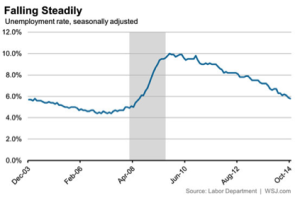
The economic dissatisfaction expressed in exit polls throughout the nation last Tuesday is not likely to end soon, despite happy-face federal government reports. As we look ahead to 2015 and beyond here in California, we should take note of some of the reasons, especially two lesser-discussed reasons.
Last Friday, the Labor Department announced that the national unemployment rate had fallen to 5.8%, as shown on the chart below from the Wall Street Journal (via Taegan Goddard). Further, 214,000 payroll jobs had been added by employers, on pace to post the largest yearly payroll job gain since 1999.
 At the same time, exit polls from the election a few days earlier found that seventy percent of Americans described the national economy as performing poorly and seventy-eight percent said they were worried about the economy’s direction in the year ahead. Only twenty-eight percent described their personal situation as improved over the past two years.
At the same time, exit polls from the election a few days earlier found that seventy percent of Americans described the national economy as performing poorly and seventy-eight percent said they were worried about the economy’s direction in the year ahead. Only twenty-eight percent described their personal situation as improved over the past two years.
What explains these seemingly contradictory numbers?
This question has been on the top of policy discussions over the past week. The answers most widely given have focused on (i) the lack of wage gains nationwide for the great majority of occupations, and (ii) the job growth concentrated in lower wage jobs—as continues to be tracked by among others the National Employment Law Project.
Added to these labor market dynamics are the additional dynamics of part-time and contingent job growth, in the place of full time jobs with expectation of continuation. For example, the number of involuntary part-time workers stood at 6.78 million in October 2014—below the levels of the previous three years, but well above pre-Great Recession levels. The number of other part-time workers stood at 20.3 million, also above pre-Great Recession levels.
These dynamics show no sign of ending or diminishing soon. They are likely to continue to mean disaffection with the economy, even as the official Labor Department reports are presented with a cheery face.
But there are two further reasons, not usually mentioned, why economic dissatisfaction will continue. The first is the rise of the benefits society, with benefit programs replacing employment. Members of this federal administration congratulate themselves on increasing various benefit rolls (rather than employment), and even worse the congratulation largely goes unchallenged in the media. No level of food stamps, income subsidies, or SSI/SSDI will lead to economic satisfaction.
The second reason is the sharpening of the meritocracy. Across the political spectrum, the unquestioned goal is job placement based on “merit”. Not only is the meritocracy, though, morally suspect—how are each of us responsible for our heredity and early environment– but also the closer we get to a meritocracy, the greater will be the economic dissatisfaction of the great majority who do not reach the highest levels (and even some who do). We’re beginning to see some of this now.
In California our levels of economic dissatisfaction are considerably less than in other parts of the nation. But the forces driving the dissatisfaction are as applicable here as elsewhere.
http://www.foxandhoundsdaily.com/2014/11/economic-dissatisfaction-will-end-soon/

